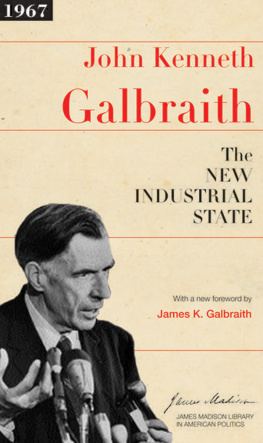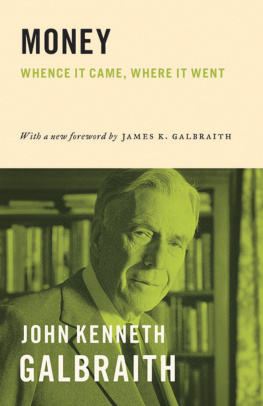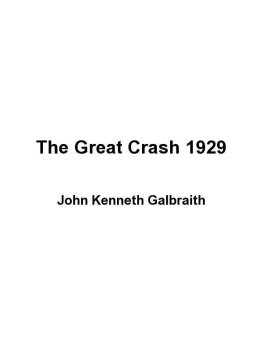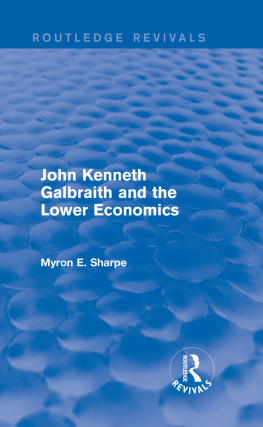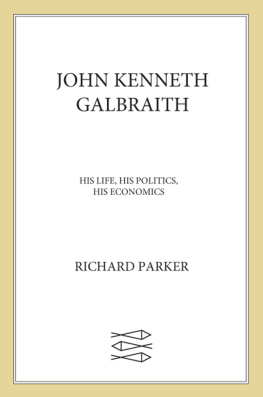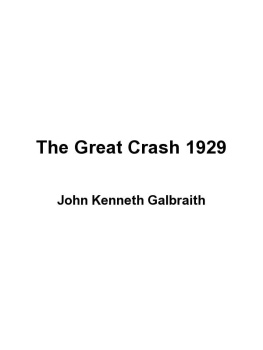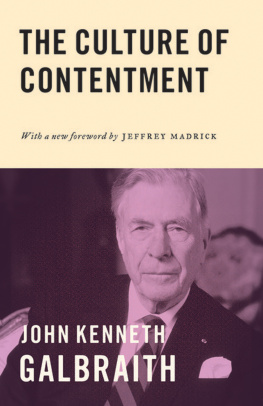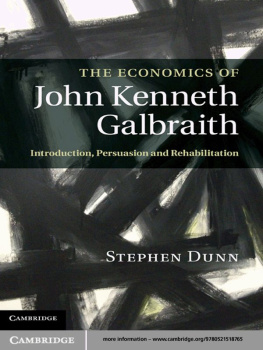John Kenneth Galbraith - The New Industrial State
Here you can read online John Kenneth Galbraith - The New Industrial State full text of the book (entire story) in english for free. Download pdf and epub, get meaning, cover and reviews about this ebook. year: 2007, publisher: Princeton University Press, genre: Politics. Description of the work, (preface) as well as reviews are available. Best literature library LitArk.com created for fans of good reading and offers a wide selection of genres:
Romance novel
Science fiction
Adventure
Detective
Science
History
Home and family
Prose
Art
Politics
Computer
Non-fiction
Religion
Business
Children
Humor
Choose a favorite category and find really read worthwhile books. Enjoy immersion in the world of imagination, feel the emotions of the characters or learn something new for yourself, make an fascinating discovery.
- Book:The New Industrial State
- Author:
- Publisher:Princeton University Press
- Genre:
- Year:2007
- Rating:3 / 5
- Favourites:Add to favourites
- Your mark:
- 60
- 1
- 2
- 3
- 4
- 5
The New Industrial State: summary, description and annotation
We offer to read an annotation, description, summary or preface (depends on what the author of the book "The New Industrial State" wrote himself). If you haven't found the necessary information about the book — write in the comments, we will try to find it.
John Kenneth Galbraith: author's other books
Who wrote The New Industrial State? Find out the surname, the name of the author of the book and a list of all author's works by series.
The New Industrial State — read online for free the complete book (whole text) full work
Below is the text of the book, divided by pages. System saving the place of the last page read, allows you to conveniently read the book "The New Industrial State" online for free, without having to search again every time where you left off. Put a bookmark, and you can go to the page where you finished reading at any time.
Font size:
Interval:
Bookmark:

The New Industrial State

THE JAMES MADISON LIBRARY IN AMERICAN POLITICS
Sean Wilentz, General Editor
The James Madison Library in American Politics of the Princeton University Press is devoted to reviving important American political writings of the recent and distant past. American politics has produced an abundance of important worksproclaiming ideas, describing candidates, explaining the inner workings of government, and analyzing political campaigns. This literature includes partisan and philosophical manifestos, pamphlets of practical political theory, muckraking exposs, autobiographies, on-the-scene reportage, and more. The James Madison Library issues fresh editions of both classic and now-neglected titles that helped shape the American political landscape. Up-to-date commentaries in each volume by leading scholars, journalists, and political figures make the books accessible to modern readers.
The Conscience of a Conservative by Barry M. Goldwater
The New Industrial State by John Kenneth Galbraith
The New Industrial State
John Kenneth Galbraith
With a new foreword by James K. Galbraith
PRINCETON UNIVERSITY PRESS
PRINCETON AND OXFORD
Copyright 1967, 1971, 1978, 1985 by John Kenneth Galbraith
Foreword 2007 by James K. Galbraith
Requests for permission to reproduce material from this work should be sent to Permissions, Princeton University Press
Published by Princeton University Press, 41 William Street, Princeton, New Jersey 08540
In the United Kingdom: Princeton University Press, 3 Market Place, Woodstock, Oxfordshire OX20 1SY
All Rights Reserved
First edition, 1967
First Princeton edition, with a new foreword by James K. Galbraith, 2007
Library of Congress Cataloging-in-Publication Data
Galbraith, John Kenneth, 19082006.
The new industrial state / John Kenneth Galbraith ; with a new foreword by James K. Galbraith. 1st Princeton ed.
p. cm. (The James Madison library in American politics)
Originally published : Boston : Houghton Mifflin, 1967.
Includes bibliographical references and index.
ISBN-13: 978-0-691-13141-2 (pbk. : alk. paper)
ISBN-10: 0-691-13141-4 (pbk. : alk. paper)
1. IndustriesUnited States. 2. Industrial policyUnited States. I. Title.
HC106.6.G35 2007
338.0973dc22 2006052864
British Library Cataloging-in-Publication Data is available
This book has been composed in Sabon with Helvetica Neue and Didot display
Printed on acid-free paper.
press.princeton.edu
Printed in the United States of America
10 9 8 7 6 5 4 3 2 1
For Andrea Williams
Contents
by James K. Galbraith |
General Editors Introduction
John Kenneth Galbraith was the most renowned and, arguably, most influential liberal economist in the United States during the decades after the Second World War. The New Industrial State is Galbraiths most comprehensive account of modern economic life. Written mainly during the years he served Presidents John F. Kennedy and Lyndon B. Johnson, and published in 1967, the book describes the vastly more sophisticated, technologically advanced business enterprises that had arisen since 1945. Galbraith presented both a fresh analysis of a thoroughly changed economic landscape (where perfect competition operated mainly as a myth) and a reasoned plea for government action to insure that too much of life is not subordinated to the requirements of powerful corporations. The book is also a thoroughgoing effort to displace older but still powerful neoclassical economic orthodoxies.
Galbraith wrote The New Industrial State with his characteristic pith, energy, and wit. As in all of his major works, he coined new terms and categories for describing the brave new world he wanted to understand, including the technostructureterms which, like his earlier inventions such as countervailing forces and conventional wisdom, remain essential parts of our vocabulary. But the book is also a serious warning to all who would continue to approach the realities of economic life with the simple categories and nostrums of yesteryear. That warning caused immediate controversy, then fell by the wayside in the 1970s and after, as proponents of promarket, small-government, antiregulation, and low-tax policies gained the political initiative. Now, though, it is arguable that The New Industrial State has the tinge of prophecy.
The James Madison Library in American Politics aims to revive classic works connected to American politics in up-to-date editions. The New Industrial State is certainly a classic, but one that illuminates the past while also raising subjects for debate about the present and the future. Thanks to the provocative and instructive new introduction by James K. Galbraith, the authors son and himself a preeminent economist, readers can now appreciate the book in its proper intellectual and historical context, as well as judge its continuing relevance.
Sean Wilentz
Foreword
James K. Galbraith
The New Industrial State was my fathers great work of theory. First published in 1967, nearly a decade after the triumph of The Affluent Society, The New Industrial State went beyond criticism of orthodox economics, beyond Marx and beyond Keynestoward a full alternative, a complete substitute for neoclassical thought. In this book, John Kenneth Galbraith forged a vision of the business firm as organization, and of an economics of organizations that together form the planning system.
The economics of organizations stands in opposition to the economics of markets. In what Galbraith called the accepted sequence, consumer preferences come first. Firms place their products before a discerning public, sell what they can, discount the rest, and then repair to study how it might be done better next time. In his own revised sequence, large firms start with the design and technology of new production. They see what is possible, they conduct market research, they decide what they like. They then engage their advertising and consumer-finance staffs to ensure that the result can be sold.
For Galbraith, this was reality; he did not oppose it. Complex technology dictates that markets must be controlled. The products that define modern lifeautomobiles, jet aircraft, electric power, microchips, and cable televisioncannot be produced except over long lead times and by the integration of vast networks of engineering talent. This requires planning. Sometimes the planning goes wrong, and sometimes a company must strike out into the unknown. But not often.
Large business firms often even replace the market altogether. This they do by integration: replacing activity previously mediated by open purchase and sale with activity either internal to the corporation, or between a large, stable enterprise and its small, specialized suppliers, to whom risk is transferred. People reduce uncertainty neither through clairvoyance (perfect foresight), nor by confident exploitation of probability (portfolio diversification). They do it by forming up into structured groups large enough to forge the future for themselves. In politics these are countries and parties; in economics, corporations.
Once control passes to the organization, Galbraith wrote, it passes completely; the economics developed to describe the small firm and its owner-entrepreneur becomes obsolete. That form of economics celebrates the rational act of maximization, which consists of finding the shortest path to a given destination. But organizations do not have destinations. They have members, participants, stakeholders, all with a diversity of talents, interests, and purposes. Decisions are made by committees; the leadership of those on top is circumscribed by the need to get the underlings to go along. Individuals, the very focal point of traditional economics, no longer matter very much. Power in the firm belongs to what Galbraith called the technostructure.
Next pageFont size:
Interval:
Bookmark:
Similar books «The New Industrial State»
Look at similar books to The New Industrial State. We have selected literature similar in name and meaning in the hope of providing readers with more options to find new, interesting, not yet read works.
Discussion, reviews of the book The New Industrial State and just readers' own opinions. Leave your comments, write what you think about the work, its meaning or the main characters. Specify what exactly you liked and what you didn't like, and why you think so.

